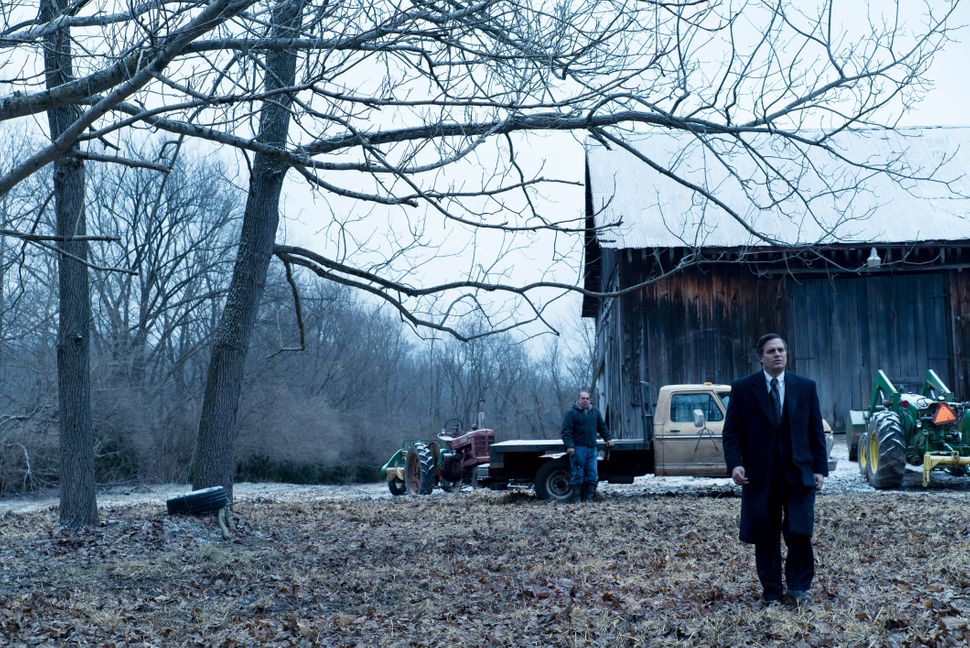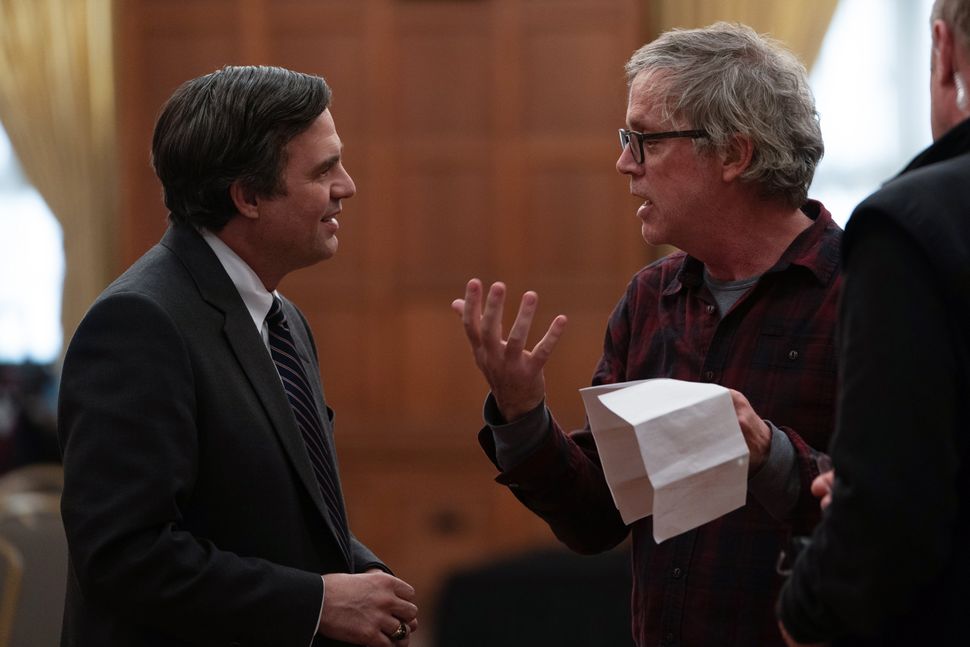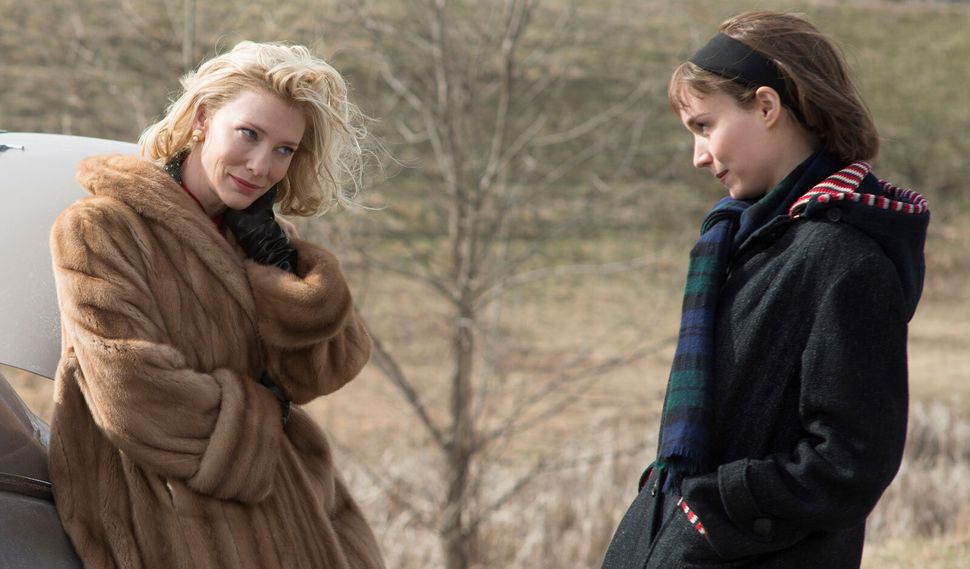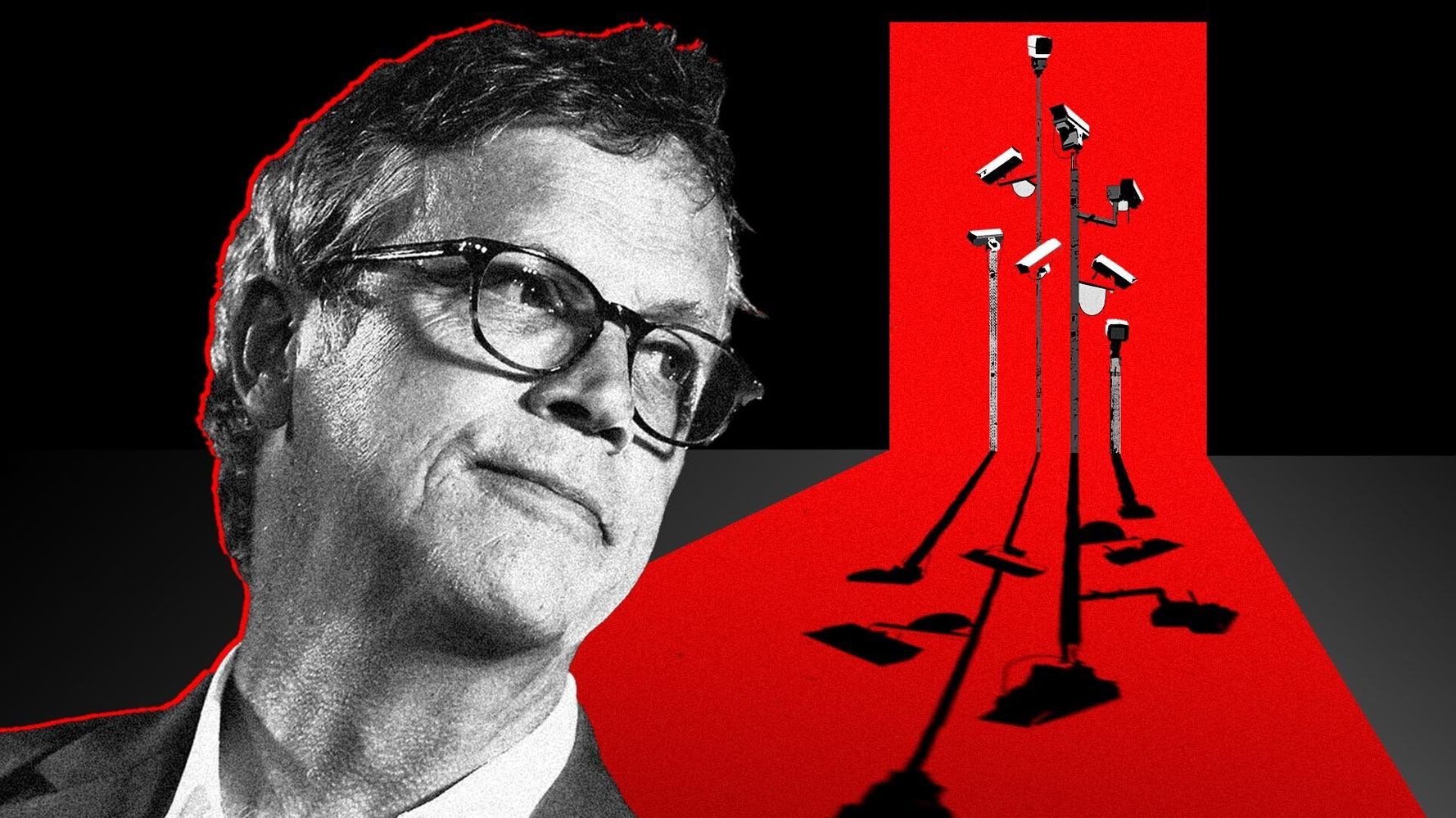[ad_1]
If you’ve followed Todd Haynes’ three-decade career — from the audacious short “Superstar: The Karen Carpenter Story” and the glam-rock fantasia “Velvet Goldmine” to the kaleidoscopic Bob Dylan biopic “I’m Not There” and the gorgeous romance “Carol” — his new legal drama about environmental corruption, “Dark Waters,” might seem like a left-field choice. It’s plottier and less experimental than most of his work. It also contains none of the queer yearning that has become a Haynes signature. Then again, corruption has always been on Haynes’ mind, just in a more intimate way. What is “Far From Heaven” if not the story of everyday Americans trapped by a reactionary society that robs their freedom of expression? Sounds pretty corrupt to me. “Dark Waters,” too, is about someone who finds himself bucking a powerful system defined by rules.
Where “Carol” and “Far From Heaven” paid homage to 1950s melodramas, “Dark Waters” revives another genre that was once more prevalent: the conspiracy thriller. For inspiration, Haynes studied “All the President’s Men,” “The Parallax View,” “Silkwood” and “The Insider.”
Mark Ruffalo plays Rob Bilott, a lawyer who took on DuPont after learning that the multibillion-dollar corporation was knowingly using a toxic chemical that seeped into the drinking water in West Virginia and Ohio. It’s the same substance used in Teflon and other household products, so what started as a local concern ballooned into a global one. Bilott started investigating the case in 1998, ultimately filing a class-action lawsuit that wasn’t settled until 2017.
The film is based on a New York Times story published in 2016. With skies as gray as DuPont’s ethics, “Dark Waters” depicts his yearslong crusade, as well as the toll it took on his family and law firm. (Anne Hathaway plays Billot’s wife, while Bill Camp, Tim Robbins, William Jackson Harper and Victor Garber round out the supporting cast.) I sat down with Haynes in New York to talk about the movie, where it fits into his career, its current political relevance and why it had to avoid the feel-good joys of “Erin Brockovich.”
With the last movie you made, “Wonderstruck,” people said, “Oh, this is such a different movie for Todd Haynes.” And now, with “Dark Waters,” people are again saying, “Oh, this is such a different movie for Todd Haynes.”
Don’t they recognize a pattern?
Did this one feel like an anomaly for you in terms of the subject matter?
Yeah, it did. Every movie creates its unique challenges that have to be addressed, and that is part of why I want to keep making movies. I want to feel like I’m learning and tackling things I’ve never done before. It’s a genre that I really have an almost compulsive relationship with. I can watch “All the President’s Men” on a weekly basis and feel like I’m learning something from it. And I had to kind of interrogate that. Like, what is it? Why? It’s great filmmaking, it’s great acting, it’s an interesting story, but there’s something about it unveiling a process. And you are engaged in that process.
And in dramatizing a process like that, which “Spotlight” also did a few years ago, you don’t need the book-report version of it.
You don’t. You’re driven by something else. And that something else is really about the human being who’s stumbling onto something and forming it in real time. And then the cost of doing so. What’s also interesting is the weird sense that you feel like you almost never leave the spaces that these people occupied. The sense of power that they’re taking on is elsewhere. When you think about movies like “All the President’s Men” or “The Parallax View” or “Silkwood” or “The Insider,” you remember these images of people in big empty spaces and the alienation that signifies.

The lone person — or maybe a pair of people — toiling away for hours at end, addressing something that is far above their heads.
Exactly. And the bigger the story gets, the more you feel like the walls are closing in on them and the darker that garage that [Robert Redford’s character in “All the President’s Men”] goes into seems to get every time he goes to talk to Deep Throat. Or the more sinister scenes of Meryl Streep getting cooked [in “Silkwood”], when she’s alone in the plant that night.
This story provided all of those signposts of this kind of genre. Also, these stories don’t wrap it up at all. Quite the contrary. They kind of open it up and we’re left with the residue of what’s been explored, and the cost of it and the weight of it and the danger of it and the paranoia of it. That’s true for this story as well. In this case, there’s this great sense of despair and a kind of heartbreak about the global impact and the people affected by this everywhere. And that was important to try to keep up. But again, you’re not always with those people, so the trick was to feel them even though you’re almost more and more increasingly isolated in Rob’s trial within the law firm and the fact that he’s more and more persona non grata.
This is certainly the most plot-heavy movie you’ve made. You had to keep a complicated timeline in order and then serve that information to the audience in a digestible way. Did you find it challenging to put all the puzzle pieces together while balancing the humanistic instinct that you’re famously drawn to?
Yes. One thing about this movie, which made it no easier, is how quickly the whole thing happened. There was really only one very early draft that was written in 2017, and that was only a year after the original New York Times story broke. We needed to get deeper and have a director come on and guide that process further, so that’s when I entered the picture. We met all the people in Parkersburg [West Virginia] after we met all the people in Cincinnati. How to construct a compelling version of this story, which is much more complicated in real life and full of more legal permutations, had to be condensed. We had to pick, particularly, the central sequence in the movie. It’s almost like the thing that you wait for in “The Insider,” to find out what it is that the Russell Crowe character is carrying inside himself like a vault and generating such angst in our anticipation of it getting cracked open.
You want to watch Rob walled in by the massive amount of material that he has to single-handedly analyze and that no one thought any single person could. And guess what? He did. So when he finally delivers it, you have to create a little bit of distance from that. There’s a sense of expectation and anticipation and hunger for what he discovers, but enough little clues dropped along the way to keep the audience going, “Oh, wow, this is getting deeper and more insidious.” It was narratively challenging to keep an audience engaged in what is, let’s face it, thirdhand information by a character who’s not particularly emotionally demonstrative or verbal. He’s kind of locked up in his own shell. By suspending our access, it makes an audience kind of lean in more, rather than delivering everything to you easily.

One movie that I think will enter people’s mind that you did not cite is “Erin Brockovich.” Did you avoid that one because of the specificity of the corporate chemical cover-ups?
I didn’t really avoid it because of its similarity to this story. It’s more I avoided it because of its differences, which to me have everything to do with this incredibly exemplary, charismatic, super-extraordinary character who is so fun to watch and who gives you such a pleasurable ride through the film. We took a different tack. The way that movie wraps up is in a great sense of victory. It feels like, “Yeah! High-five! She did it!” This movie doesn’t let you off the hook that way, and I found that to be important.
In 2015, “Carol” was the talk of the town in a lot of ways. I’m curious whether that experience left you disappointed when “Wonderstruck” didn’t perform better or get more attention.
Well, yeah. I think everyone involved with “Wonderstruck” hoped for it having a bigger life or being more accessible. It was still a very different kind of audience than I had approached before. I don’t really know what the better marketing campaign would’ve been for a movie like that. I think it’s a tricky one, and I think maybe the deaf themes in the film were used more as a platform for describing what was unique about it than maybe the fact that it was a very different and unusual kind of story for kids in general. And maybe the silent-film aspect of it was less enticing to family audiences, possibly. It was a formalist experiment by intercutting these time periods and having these parallel stories, which I thought was so fanciful and lovely and mysterious and could be so beautiful. But yeah, it’s just sort of what happened.
It could almost seem like making “Dark Waters” is a response to “Wonderstruck.” It’s the opposite in a lot of ways: less about feelings and more about facts.
I’m very proud of “Wonderstruck” and very happy I did it. And the funny thing is that most of my films did not have an immediate receptivity. I don’t know if this will be true for “Wonderstruck,” but it took a while for most of them to find their audiences. Initially people would scratch their heads and not really know how to situate a lot of them. So I also know that’s just the nature of movies that don’t look like other movies that we see. They don’t fit automatically into boxes that we recognize.

That’s particularly true of “Safe” and “Velvet Goldmine,” whereas “Far From Heaven” got a big Oscar push and “Mildred Pierce” had a major platform in HBO. Since people seem to not know how to position your films, to what degree has that informed your work over the years?
I don’t think it’s really changed what I pick or what I want to work on. With this one, I knew there were great reasons for more people to see a film like this than maybe some of my films of the past, given the political relevance of it and the social relevance of it and our election year that’s coming at us like a Mack Truck and the truly heartbreaking themes in the movie.
But yeah. I’m just always sort of taking things project by project. And in this case, I had two other projects that I’ve been developing. One of them was this Velvet Underground documentary, which preceded “Dark Waters,” and I set up the structure for a limited series about the life of Freud. Those were the things that I was attending to first, and all of a sudden my schedule shifted and I could consider “Dark Waters.” The idea of working with Mark Ruffalo and getting into a genre I hadn’t explored before but that I’ve always dug was motivation enough.
The story told in “Dark Waters” started more than 20 years ago, but in the past couple of years, corporate dominance has really become a driving political issue. Were you immediately conscious of that timeliness?
Oh, tremendously so. I mean, mostly the environmental issues driving it, and corporate corruption and a government that completely yields to the interests of industry and has increasingly done so since the Reagan administration. But in our current administration, to a degree, that almost seems reactionary, if not vindictive, to the interest of people and their health and science and truth, right?
But I also felt like I missed serious, dramatic, grown-up movies that have an ambiguity about them. None of the characters in this movie initiate from clearly morally pure places. They’re all a bit murky, with the exception of maybe Wilbur Tennant, the farmer [whose cattle died from DuPont’s poisoned water]. Everybody is sort of on the wrong side of the issue when they come upon this story, and they all have to shift sides and take on the very systems that they’re there to defend.
In movies like this, we tend to see the male protagonist’s wife left waiting at home. She maybe gets two scenes, and her job is to be worried for the man. But the Anne Hathaway character gets a lot more to do. She has an interiority that we are often denied in movies where the man is landing the plane or the man is racing the car or the man is taking down the institution. You’ve always have nuanced female characters, so was that trap something you set out to avoid?
Absolutely. We tried as best we could. I mean, she’s still chosen to be the person who runs the household for Rob and give up her practice. That was something they decided well before this case stumbled into their lives. But when you meet Sarah Barlage, the wife of Rob Billot, you see right away — and they speak about this very openly as a couple — how antithetical they are in temperament to each other. She’s the extrovert, and he’s the introvert. She is opinionated, and he’s guarded and suspicious. She is an overt Catholic, single-issue voter, and he is probably a bit less partisan in his political and religious orientation. He adored his boys, but so many hours were consumed with the efforts that he took on. I think he was emotionally compromised by it. There was a real severe depression that set in, and that would play out in their domestic life. All of that was really essential to this story, and it contributes to describing the cost that these kinds of individuals go through. And it’s not just on their own shoulders; it’s on the shoulders of their partners and their kids and their communities and their parents. That part of it is heartbreaking and complicated, and so we really wanted to give it as much attention as we could.
This interview has been edited and condensed.
REAL LIFE. REAL NEWS. REAL VOICES.
Help us tell more of the stories that matter from voices that too often remain unheard.
[ad_2]
Source link

